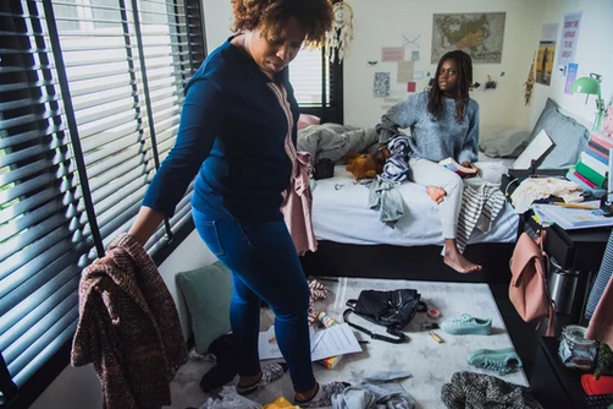
Avoiding Bedroom Battles
Half-empty yogurt containers, piles of crumpled papers, muddy sneakers…Are these the sights that greet you when you open your daughter’s bedroom door? Are you treated to wet towels on the floor and a mass of hair in the bathtub drain? If so, you’re not alone, although that might not make the mess any easier to bear. Especially if you tend to run more toward the neatnik end of the continuum, conflicts over the state of a teen bedroom are classic battle-starters in families. But here’s the good news: You can get through these years without ever having a single battle over the bedroom. Yes, truly.
First, as the parent of an adolescent, you must choose your battles carefully. If you focus on every trivial infraction of the rules or each annoying sock or scrunchie on the floor, your home will become a battleground. When teens feel chronically nagged or criticized, they are less likely to want to please and therefore more inclined to defy your requests. The thinking goes, “Since my mom is always on my back/won’t stop bugging me/will never be happy, I might as well keep doing what I’m doing.” When you pick the issues to focus on, you preserve time, energy, and emotional resources for the matters that are most important to you—and let the rest go.
Many bedroom battles are really about how everyone is dealing with teens’ growing autonomy and separation from parents. It helps to empathize with teens’ perceptions of bedrooms as a private refuge, the one place on Earth they can be truly themselves, without having to prove themselves to teachers, friends, or parents. In the sanctity of this room, your daughter sheds the self-consciousness she feels as she walks through the school hallways. She mentally replays past conversations, rehearses comebacks, and analyzes her new look in her mirror. It is good to remind yourself that when she forgets to hang up the new clothes you bought her or plasters her recently repainted walls with strange or unappealing posters, she is likely not trying to irk you. She’s probably only thinking, “It’s my room!”
How you handle your disapproval reflects your own values, tolerance for teens’ changing tastes, and respect for their individuality. The first step is figuring out what you absolutely cannot tolerate. For example, if your biggest concern is safety, you’ll probably nix lit candles if your daughter’s room is littered with papers or other flammables. If hygiene is the issue, animals may be banned. Some parents permit food under certain conditions, while others okay only beverages. If you object to filth, you may overlook temporary clutter and disorder but insist on the room being cleaned regularly. If, however, it is just her taste in décor that troubles you, if her collection of “treasures” are not offensive or counter to your family’s values you may be able to let it go. Consider a simple but effective strategy: Close her door.
When your limits are clear in your own mind, explain them to your teen clearly and directly. Since it is your home, she needs to honor your standards, regardless of if she agrees with you. But your respect for the individuality she portrays in her bedroom supports her strong sense of self and a solid parent-child relationship. Plus, as experience proves over and again, teens are far more inclined to organize bedrooms—and far more effectively—when it’s their idea.